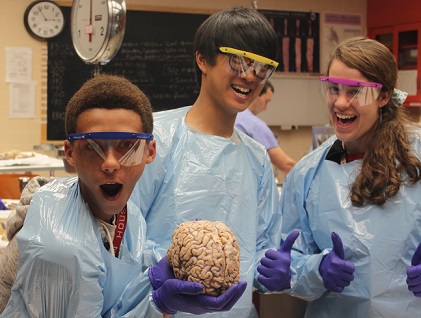$2.1 Million Grant Will Help Gifted, Low-Income Middle School Students
December 15, 2015

Photo courtesy WCATY
“Supporting Smart Spaces,” a project of the Wisconsin Center for Academically Talented Youth (WCATY) and the Wisconsin Center for Education Research (WCER) at the University of Wisconsin-Madison School of Education, has been awarded a $2.1 million grant by the Jacob K. Javits Program through the U.S. Department of Education.
Over the next five years, this funding will make it possible to improve curriculum and educational programs for approximately 800 academically advanced 6th- and 7th-grade students in Wisconsin. Public schools in Milwaukee, Madison and Adams-Friendship, as well as the Green Bay Catholic Diocese, will adopt the “Smart Spaces” blended online courses for two consecutive years, targeting their gifted, low-income students.
“Smart Spaces” focuses on narrowing the “excellence gap” — opportunity and achievement gaps on the upper end of the achievement spectrum — for both students of color and those from low-income families.
Participating in “Smart Spaces” is completely voluntary for identified advanced learners. But WCER’s Bradley Carl, the project co-principal investigator overseeing the evaluation process, hopes that both parents and students understand the long-term benefits of participating in this innovative program.
“People think that kids who drop out of school are exclusively low-performing kids — and some are, certainly — but it is much broader than that,” says Carl. “Plenty of smart kids wind up in various levels of disengagement from school and one of the reasons is that they get bored. Gifted and talented programming stimulates the imagination of students and can put them onto a trajectory of something bigger and better, like going to college.”
“Smart Spaces” involves the collaboration of researchers, evaluators, teachers, families and students. Programs will roll out by district over multiple stages and include: 14 weeks of innovative and challenging blended online and classroom courses; interviews with principals and teachers to identify how they currently serve gifted students; training for literacy teachers in identifying gifted students; workshops to help students determine their own identities and learning needs; and community events to bring students and families together.
According to WCER’s Annalee Good, the project director and principal investigator, funding for gifted education is lacking throughout the state. “We hear all the time from schools that they don’t have adequate resources to serve their advanced learners,” says Good. “This is coupled with persistent racial and socioeconomic patterns in access, where particular groups of kids are under-identified and underserved in gifted programs.”
WCATY is housed in the office of Education Outreach and Partnerships, led by co-PI Beth Giles. WCATY co-director Rebecca Vonesh explains that “Smart Spaces” evolved from a highly successful program developed more than 15 years ago. “We are taking already existing curriculum from our online academy and adding more face-to-face time and self-advocacy elements.”
One of the main objectives of “Smart Spaces” courses is to challenge students to think like a designer, engineer, researcher or historian, and build an applied project.
WCATY’s Vonesh says the short-term goal of “Smart Spaces” is to see clear growth in the students’ writing abilities. Her long-term objectives are a little harder to measure.
“We are hoping to help middle school kids develop soft skills, which help them envision who they might be in the future,” she explains. “Middle school is totally about peer groups and figuring out who you are. We want to help these kids develop a geek identity that they can carry with them and tap into when they need it. That’s why it is so important to develop a space where being a geek is cool.”


